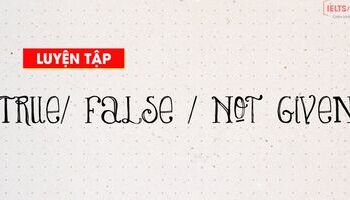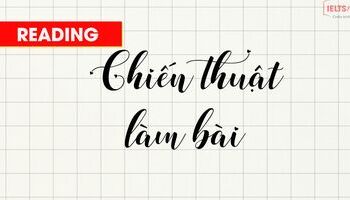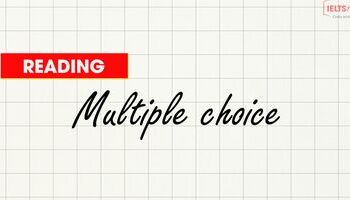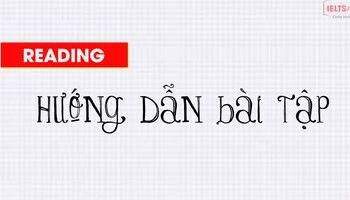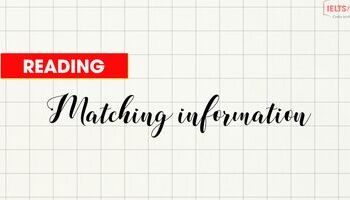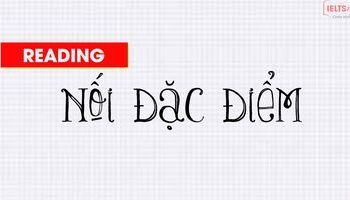Dạng bài True/ False/Not given: mini-passage 1
Review
- Đọc câu hỏi trước. Nên nhớ là đọc 2 câu một. Chia từng câu hỏi ra thành các từ khóa (key words)
- Đọc đoạn văn và tìm thông tin ( các câu hỏi được sắp xếp theo thứ tự giống như thông tin trong đoạn văn) Sau khi xác định được thông tin liên quan trong đoạn văn, chúng ta đối chiếu thông tin giữa câu hỏi và đoạn bài đọc
- Điền True nếu tất cả các thông tin trùng khớp, False nếu có thông tin đối lập hoặc khác và Not Given khi thông tin bị thiếu hoặc không được nói đến
Dạng bài True/False/Not Given và dạng Yes/No/Not Given các làm hoàn toàn giống nhau. Thí sinh nên đọc kỹ yêu cầu trước khi điền vào phiếu trả lời. Nếu đề bài yêu cầu điền Yes/No/Not given mà trong phiếu trả lời chúng ta ghi Yes/No/Not Given sẽ không được chấp nhận
Mini-passage
Watching television makes toddlers fatter and stupider at primary school, according to new research. Scientists who tracked the progress of pre-school children found that the more television they watched the worse they were at mathematics, the more junk food they ate, and the more they were bullied by other pupils.
The findings, which support earlier evidence indicating television harms cognitive development, prompted calls for the Government to set limits on how much children should watch. American paediatricians advise that under-twos should not watch any television and that older children should view one to two hours a day at most. France has banned shows aimed at under-threes, and Australia recommends that three to five year-olds watch no more than an hour a day. Britain has no official advice.
Researchers said that pre-school is a critical time for brain development and that TV watching displaced time that could be spent engaging in “developmentally enriching tasks”. Even incremental exposure to TV delayed development, said the lead author Dr Linda Pagani, of Montreal University.
According to the article, are these statements true, false or not given?
1. Scientists believe that there is a link between the amount of television young children watch and their mental ability.
2. Shows aimed at under-twos are banned in the USA.
3. Children’s television programming is more strictly controlled in France than in Britain
Answers and discussion
1. True
Câu hỏi: Scientists believe that there is a link between the amount of television young children watch and their mental ability.
Câu chứa thông tin: Scientists who tracked the progress of pre-school children found that the more television they watched the worse they were at mathematics, the more junk food they ate, and the more they were bullied by other pupils
Đối chiếu thông tin
Scientists = Scientists
young children = pre-school children
a link = the more……….the worse
mental ability = mathematics
tất cả các thông tin đều đúng do vậy chúng ta kết luận này là True
2. Not given
Câu hỏi: Shows aimed at under-twos are banned in the USA.
Câu chứa thông tin: American paediatricians advise that under-twos should not watch any television
Đối chiếu thông tin
American = USA
Shows aimed at under-twos = under-twos….television
Như vậy còn 1 thông tin nữa: trong bài đọc chỉ nhắc đến những shows aimed at under-twos thì được khuyên không nên xem chứ không hề nhắc đến có bị cấm (banned) hay không. Vậy, đáp án câu này là Not given
3. True
Câu hỏi: Children’s television programming is more strictly controlled in France than in Britain
Câu chứa thông tin: France has banned shows aimed at under-threes, and Australia recommends that three to five year-olds watch no more than an hour a day. Britain has no official advice.
Đối chiếu thông tin
Children’s television programming = shows aimed at under threes
Trong khi France : banned shows aim at under-threes ( cấm các chương trình TV cho trẻ dưới 3 tuổi) thì ở Britain: has no official advice ( không hề có lời khuyên chính thức nào) ====> các chương trình TV cho trẻ em ở Pháp bị quản lý nghiêm ngặt hơn ở Anh. Do vậy chúng ta kết luận đáp án là True
Sau khi hoàn thành mỗi bài tập, các em không nên chỉ so sánh đáp án đúng sai mà hãy tìm hiểu kỹ tại sao mình sai và làm lại câu đó nhé. Học từ lỗi sai của mình là cách tốt nhất để các em tránh những sai sót lần sau.
Chúc các em học tốt!
